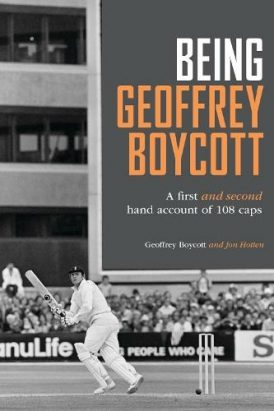Being Geoffrey Boycott
Martin Chandler |Published: 2022
Pages: 308
Author: Boycott, Geoffrey and Hotten, John
Publisher: Fairfield Books
Rating: 4.5 stars

My first thought when I heard this book was being published was whether the cricket world really needed another book with Sir Geoffrey Boycott’s name on the spine. After all no one can suggest that he hasn’t already done his bit for the literature of the game. For a start there have been two autobiographies already (in 1987 and 2014), and three tour books (Australia in 1978/79 and 1979/80 followed by West Indies in 1980/81).
And that isn’t all. Sir Geoffrey has also given the world an instructional book, Play Cricket The Right Way, and two books of comment, Boycott on Cricket and, clearly struggling for titles, Geoffrey Boycott on Cricket, in 1990 and 1999. As for biographies there have been a few of those as well, to my certain recollection Don Mosey, John Callaghan, CD Clark and Leo McKinstrey all having had a crack at that one.
Despite those misgivings I am however pleased to report that Being Geoffrey Boycott is an excellent book, and adds much to Sir Geoffrey’s previous writings. He may be an octogenarian now, but his recall is as sharp as ever. In addition Sir Geoffrey’s hard won status as a national treasure has mellowed him just a tad, and whilst his views are as trenchant as ever and the chip on his shoulder remains that chip has, perhaps, fallen away somewhat.
As to why we have this one Sir Geoffrey is yet another of the not inconsiderable number of people who chose to use their time during lockdown to write a book and the premise of Being Geoffrey Boycott is a simple one. The book represents Sir Geoffrey’s thoughts each of the 108* Test matches for which he was selected between 1964 and 1982.
In a sense therefore the book has something in common with an autobiography, and there is obviously a good deal of material in it which has already been covered in 1987’s My Autobiography. That book was, as cricket books go, a bestseller and a cynical author might just rehash what he had written before.
At one time or other I have read all of Sir Geoffrey’s previous books, not necessarily from cover to cover in each case and certainly not in recent years, but he has always been a source of fascination even to (or perhaps especially to?) a Lancastrian. So does he add anything to what he has already set down in writing?
I could, of course, have dusted off my copy of My Autobiography and read that from cover to cover before opening the new book, but I contented myself with just a couple of incidents. The first was one of the more famous Boycott controversies, his being dropped for slow scoring after his Test best 246 against India in 1967. The second is a long forgotten one, his supposed show of dissent when adjudged run out in the sixth Test in Australia in 1970/71.
Dealing with the 246 there is probably a whole book to be written on the issues that raised, and it rightly took up a whole chapter of My Autobiography. As he made it clear would be the case in 1987 Sir Geoffrey feels as wronged now as he did then by the whole episode. That much acknowledged 35 years on, and the only man in the eye of the storm still alive, the views are rather more measured, Sir Geoffrey no doubt feeling (and with some justification) that in the long run his popularity now, much greater than it was in 1987, vindicates his position on the matter.
The run out incident once again demonstrates that Sir Geoffrey has not mellowed in any way, but once more his tone is a little less confrontational and more reflective than it was in 1987 and, on this occasion, he expands somewhat on the thoughts he articulated in My Autobiography.
An unexpected, although it probably shouldn’t have been, feature of Being Geoffrey Boycott is the realisation that Sir Geoffrey had normal human frailties. In particular in his early games there are two recurring features, those being fears of losing form and consequently his place, and of injury. Sir Geoffrey a mere mortal like the rest of us? Well not exactly, as I still think the extent of his determination to succeed by following his own path is almost superhuman, but his book reinforces the point that he is the sort of man most of us would much enjoy having a pint with.
That there are 108 matches to go through, not all of which were notable games or ones to which Sir Geoffrey made a significant contribution, also means that by its nature a goodly part of the book chronicles parts of his career that Sir Geoffrey has not written very much about before. This gives him the opportunity to digress a little and comment on some who are not central to the better known parts of his career. Something that struck me time and again was just how highly he rates Garry Sobers, and one comment in particular resonated; on the field he believes anything is possible. Maybe some of it rubs off on you …..
After reading Being Geoffrey Boycott I think it very likely that its publication means that cricket literature will never require another book about Sir Geoffrey. But it certainly did need this one, which is highly recommended.
*As Sir Geoffrey points out he was actually selected for 110 but, courtesy of some duplicitous behaviour on the part of certain administrators two of those matches, against the immensely powerful Rest of the Word XI of 1970 when he scored 15, 64, 24 and 157, were later downgraded.






Leave a comment